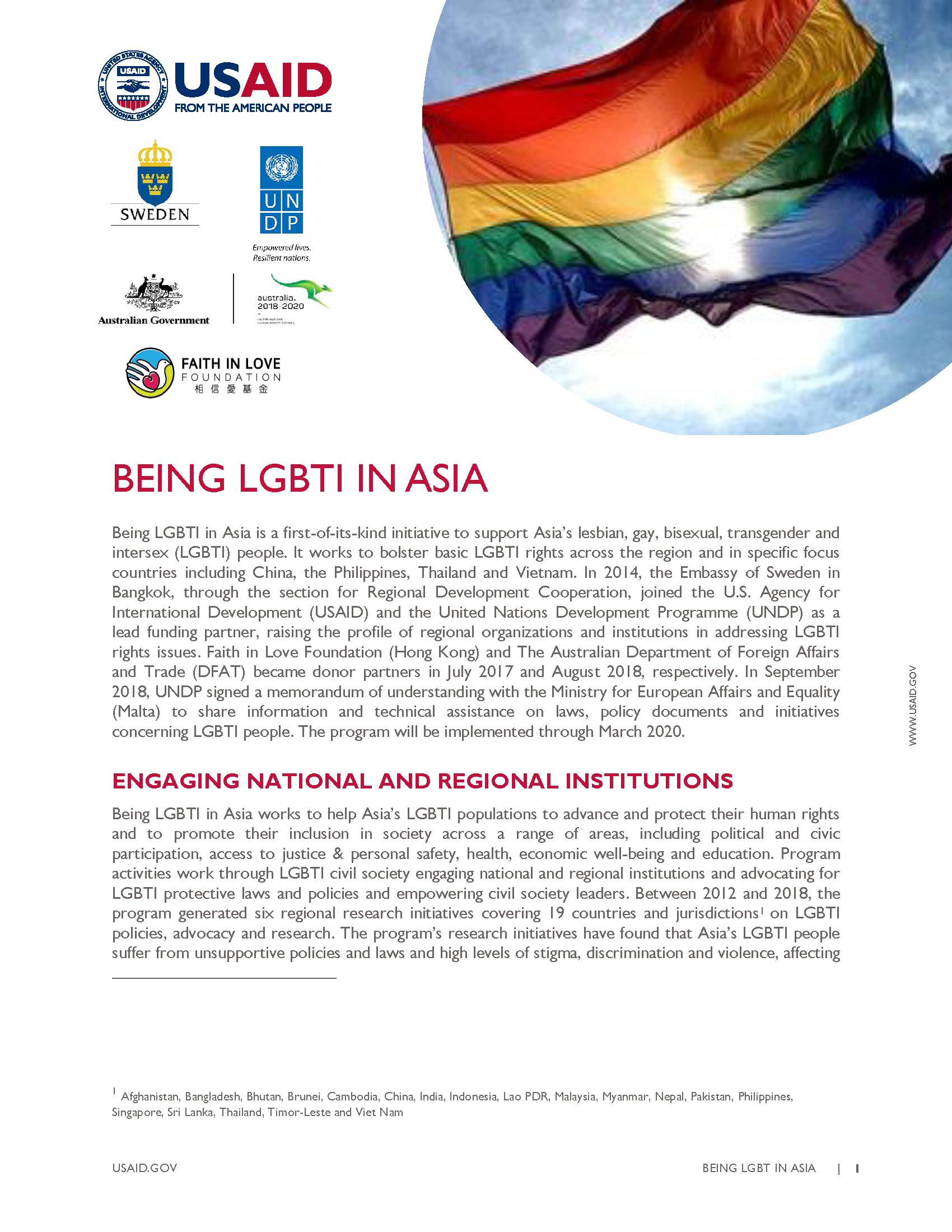Speeches Shim
Being LGBTI in Asia is a first-of-its-kind initiative to support Asia’s lesbian, gay, bisexual, transgender and intersex (LGBTI) people. It works to bolster basic LGBTI rights across the region and in specific focus countries including China, the Philippines, Thailand and Vietnam. In 2014, the Embassy of Sweden in Bangkok, through the section for Regional Development Cooperation, joined the U.S. Agency for International Development (USAID) and the United Nations Development Programme (UNDP) as a lead funding partner, raising the profile of regional organizations and institutions in addressing LGBTI rights issues. Faith in Love Foundation (Hong Kong) and The Australian Department of Foreign Affairs and Trade (DFAT) became donor partners in July 2017 and August 2018, respectively. In September 2018, UNDP signed a memorandum of understanding with the Ministry for European Affairs and Equality (Malta) to share information and technical assistance on laws, policy documents and initiatives concerning LGBTI people. The program will be implemented through March 2020.
Being LGBTI in Asia ![]() (pdf - 217k)
(pdf - 217k)
ENGAGING NATIONAL AND REGIONAL INSTITUTIONS
Being LGBTI in Asia works to help Asia’s LGBTI populations to advance and protect their human rights and to promote their inclusion in society across a range of areas, including political and civic participation, access to justice & personal safety, health, economic well-being and education. Program activities work through LGBTI civil society engaging national and regional institutions and advocating for LGBTI protective laws and policies and empowering civil society leaders. Between 2012 and 2018, the program generated six regional research initiatives covering 19 countries and jurisdictions on LGBTI policies, advocacy and research. The program’s research initiatives have found that Asia’s LGBTI people suffer from unsupportive policies and laws and high levels of stigma, discrimination and violence, affecting every aspect of LGBTI people’s lives. Data generated through research has provided evidence-based advocacy for legal and policy development and for improving the inclusiveness of LGBTI people in society.
ADVOCATING FOR LGBT PROTECTIVE LAWS AND POLICIES
Key objectives include working with LGBTI civil society to engage with country-level institutions to advocate for LGBTI protective laws and policies and supporting community empowerment and mobilization activities. The program also supports multi-stakeholder dialogues on LGBTI rights, promoting advocacy frameworks to address discrimination and assist in legal challenges. In doing so, the program conducts policy and operational research. It also promotes strategy development among key populations including faith-based communities and the private sector to effectively address LGBTI and sexual orientation, gender identity and expression and sex characteristics (SOGIESC) issues.
GENERATING PARTNERSHIPS, DIALOGUE AND UNDERSTANDING
The program has been successful in building a coalition of support bringing together 224 government departments, 612 civil society organizations, 28 human rights bodies and 173 private sector organizations across 60 countries worldwide, including 34 countries and jurisdictions in the region. The partnership has reviewed LGBTI rights in Asia, establishing country-level dialogues and publishing reports for eight countries: Cambodia, China, Mongolia, Nepal, Philippines, Thailand and Vietnam. The program is working with the ASEAN SOGIE Caucus (ASC), the Asia-Pacific Transgender Network (APTN), the Asia-Pacific Forum of National Human Rights Institutions (APF), the Economist Events, the Salzburg Global Forum and other UN agencies including International Labor Organization (ILO), Office of the United Nations High Commissioner for Human Rights (OHCHR), Joint United Nations Program on HIV/AIDS (UNAIDS), United Nations Educational, Scientific and Cultural Organization (UNESCO), United Nations Population Fund (UNFPA), UN Women and World Health Organization (WHO). The program has an active social media presence through Facebook (100,000+ likes*), Twitter (8,500+ followers*), China’s popular social media site, Weibo (206,270 followers*), Instagram and Medium.
On private sector engagement, the Economist has been a key partner and key financial contributor to-date, having provided approximately $600,000 in in-kind support to co-convene the annual Pride and Prejudice global dialogues in Hong Kong in 2015-2019 in addition to $60,000 in co-funding from UNDP. At the country level, organizations including HP Philippines, EOI India, LinkedIn India, and Philippine Financial Industry Pride have supported convening of national executive dialogues to an estimated dollar value of $60,000. Finally, direct financial support paid to UNDP directly amounts to $70,000 from a private Hong Kong based foundation (Faith in Love) to support a United Nations Volunteer to work on private sector engagement, developing a private sector engagement strategy.
OUTCOMES - 'BEING LGBT IN ASIA' COUNTRY REPORTS
The current “Being LGBT in Asia” analysis covers eight countries: Cambodia, China, Indonesia, Mongolia, Nepal, the Philippines, Thailand and Vietnam. Below are the Country Reports that have already been released: (all with links to pdf files)
Being LGBT in Asia: Cambodia Country Report
English | Khmer
Press Release
Being LGBT in Asia: China Country Report
English | Chinese
Press Release
Being LGBT in Asia: Indonesia Country Report
English | Bahasa Indonesia
Press Release
Being LGBT in Asia: Mongolia Country Report
English | Mongolian
Press Release
Being LGBT in Asia: Nepal Country Report
English | Nepali
Press Release
Being LGBT in Asia: Philippines Country Report
English
Press Release
Being LGBT in Asia: Thailand Country Report
English | Thai
Press Release
Being LGBT in Asia: Vietnam Country Report
English | Vietnamese
Press Release
STORIES OF BEING ME
USAID and UNDP have been working with Philippines-based B-Change Foundation in seven capital cities around Asia to develop a series of ‘Stories of Being Me’ video documentaries through an online LGBT crowd-sourcing campaign. These videos are now hosted on BE, a web-app designed as a community and knowledge base for young people from diverse sexual orientations and gender identities.
Below are the videos that are self-filmed by the subjects or their friends and have been officially released:
The Stories of Ngo Menghourng (Cambodia)
The Stories of Imam (Indonesia)
The Stories of Cha Roque (Philippines)
The Stories of Sophon Shimjinda (Thailand)
The Stories of Darius (Singapore)
LAUNCH OF "BEING LGBT IN ASIA" PHASE II
UNDP’S “BEING LGBT IN ASIA” WEBPAGE:
www.asia-pacific.undp.org/content/rbap/en/home/operations/projects/overview/being-lgbt-in-asia/


Comment
Make a general inquiry or suggest an improvement.